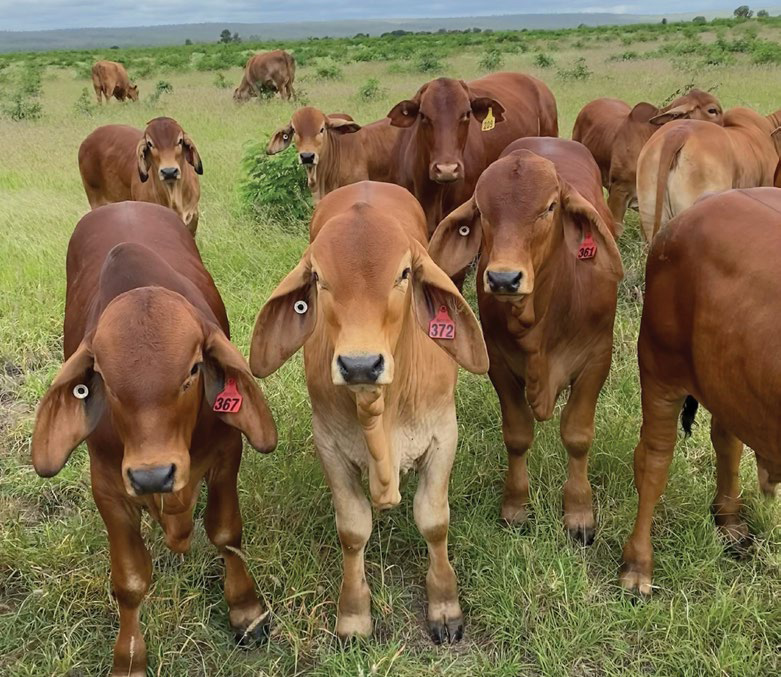Having just completed a family succession process, Ashley and Kate Kirk are now the sole owners of Rockley prefix and their property, Ungarra, near Moura. Previously, Ashley was a co-owner and stud manager of the Rockley stud, commercial herd and aggregation of three properties with his parents, Chris and Sally Kirk.
Arnie Kirk founded the Rockley prefix with Chris, and now Ashley, following in his footsteps. In time, perhaps Ashley and Kate’s eldest son, named after his great-grandfather Arnie will continue the family legacy.
“We have been rebuilding the Rockley herd since 2012 when the detection of BJD in three of our cows devastated us and our business,” says Ashley. “Having our team of bulls sell well at Rockhampton Brahman Week Sale this year felt great – it really felt like we were back in business!”
Ungarra is a 3080 ha property in the fertile Callide Dawson region near Moura. It is mainly brigalow scrub country with 1000 ha of Leucaena and home to the Rockley breeding herd of around 75 stud cows as well as 150 recipients for the IVF programs.
“We are winding up our commercial bull breeding program and have kept the best mothers from this herd as recipient cows,” says Ashley.
“Currently we produce around 150 calves a year through natural mating and IVF. The plan is to increase numbers to 200 stud breeders and produce 100 IVF calves annually.”
Having collected eggs from their ten best cows in 2012, the Kirks have used IVF to rebuild their herd using their proven genetic base. The weaner selection system has also proven invaluable in selecting the very best of each year’s weaners to enter the breeding program. After recording the parental attributes, each weaner is assessed in a small yard and graded against a set of ten phenotypic criteria: bone, feet and legs, head, muscle, back end, temperament, topline, underline, length and general appearance.
“Each weaner is awarded a cumulative score with a higher score predicting higher performance and profitability,” says Ashley. “We have also started collecting data and entering it in to Breedplan to build accuracy in our genotypic data and have entered bulls in the Repronomics program with David Johnson for more detailed genotypic assessment of each bull through his progeny.”
Data collection is essential to the Rockley breeding program as they seek to balance genotypic and phenotypic information when selecting males and females for the stud. Ashley is collecting data on each animal in the breeding program including birth weight, flight time, 200, 400 and 600 day weights, carcase data, including rib and rump fat measurements and EMA, scrotal measurements at 400 days to assess age of puberty, 600 day semen morphology, days to calving to measure how quickly a female can conceive when a bull is introduced and mature cow weight after each calf is weaned. Rockley’s entire herd is genomics tested and parent verified. Each calf is tissue sampled at time of birth weight recording.
“The more information we collect over time and the more bulls in the program, the more linkages can be made through their progeny and the higher the accuracy of the EBVs,” says Ashley. “This helps us with our selection, and it is also of great value to buyers looking to improve specific traits in their own herds.”
“For example, we have used highly heritable traits such as birth weight and growth rate to select sires with low birth weight and fast early growth rate genetics,” he says. “In a commercial setting, this combination increases calving rate by reducing dystocia, and these calves will do well on pasture and meet market standards.”
Rockley breeding program All Rockley stud breeders are naturally mated for 100 days from October to January, a short mating season designed to apply fertility pressure to the herd. All empties are culled. The Kirks also conduct two IVF rounds each year, safely harvesting eggs from their ten or so donor cows, even while they are in calf. Ashley collects the eggs and sends them to IGT’s specialist lab in Brisbane for fertilisation. He then prepares the recipient cows at Ungarra to receive the embryos.
Cows must pass the weaner selection program, meet Rockley’s seven breeding attributes and have raised three calves from natural conception in a row before entering the donor program. Donor eggs are matched with semen from bulls that improve on the cow’s traits. The breeding attributes the Kirks look for in all their stud animals are fertility, quiet temperament, sound udder (in females and mother’s udder is taken into account when selecting bulls), do-ability, structural soundness, length and width, and clean underlines (in males). “Fertility is a key trait that we are breeding for, measured in days to calving and scrotal size,” says Ashley. “Days to calving is hard-to-get data as you need female progeny of the sire having calves. The more data we have on this trait the more accurately we can predict female fertility in young sires based on genetic linkages. Scrotal size is an easy-to-measure indicator of male fertility.”
Rockley is a 100% red Brahman breeder herd but the Kirks have used grey genetics in the past to good effect, resulting in some lighter-coloured breeders. Having based their original herd on polled Shorthorn genetics there has been a strong polled influence from the beginning. Ashley expects to have the whole herd being homozygous polled or polled/scurred by 2025.
Main sales RBWS and Big Country Rockley returned to RBWS and Big Country sales in small numbers in 2016 after a three-year absence and are now closing in on selling their full quota again.
RBWS 2022 saw Ashley and Kate selling for the first time as Rockley vendors in their own right. They were pleased with the result for their team of nine red sires led by Rockley Esteban (PP), placing them second on the vendor averages leaderboard.
“Esteban has good data to back up his visual appeal, plus being homozygous polled and lovely cherry red colour,” says Ashley. “Buyers are seeing the value of EBV data to help them make their selections before they see bulls at the sale. We retained a one-quarter share in him and plan to use semen collected prior to the sale in our future IVF breeding program.”
New ventures Ashley and Kate have entered a new business venture, Rockley and Elmo Brahmans Partnership, with Allan and Leonie Trail, Elmo prefix, Baralaba. Together they have registered Elm-Roc prefix and made their first purchase at RBWS 2022, taking home sale-topper Fairy Springs Capitalist 6179 (PP) for use in all three stud herds.
“The Elm-Roc herd is running at Ungarra and is comprised of Elmo females,” says Ashley. “This joint venture is a way for us to access new genetics and to increase our herd size. All progeny from the Elmo females will be fully recorded and run alongside the Rockley herd.”
Since finalising their succession plan, Ashley has been phasing out the commercial bull breeding side of their business, which currently sells about 100 herd bulls to pastoral companies in Western Australia and the Northern Territory.
They plan instead to use a new online sale platform to sell their grass-fed fully registered and Breedplan-recorded Rockley bulls with commercial appeal. These bulls will have data and pedigree not usually available for the existing commercial herd bulls.
Story from ABBA December 2022 Issue
By Cindy Benjamin, photos by Georgie Connor



